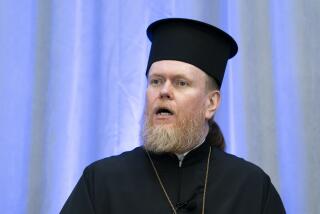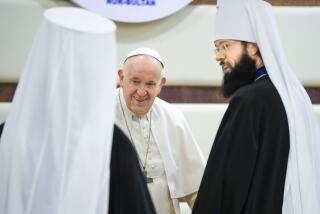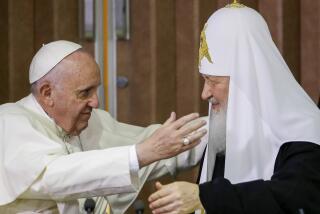Russian Orthodox Leader Seeks Help in U.S. : Aleksei II: His warm reception here illustrates his popularity and potential ability to help solve religious and economic problems that are tearing at his nation.
- Share via
NEW YORK — The enthusiastic reception that Russian Orthodox Patriarch Aleksei II has received during his 10-day visit to the United States--the first ever by the head of the largest Orthodox church in the world--illustrates his popularity and potential ability to help solve religious and economic problems that are tearing his nation apart.
The specter of widespread malnutrition, severe respiratory diseases and, in some cases, certain death due to the lack of food and medical supplies, looms large this winter in the Soviet republics.
At the same time, new religious freedom has led to both clashes between Orthodox Christians and members of other churches, particularly Catholics in the Ukraine.
“I serve in a country full of contradictions, which has expressed violence towards the church and given few benefits to the poor,” he said. “Now people look to the church for miracles.”
During his 10-day visit to several East Coast cities that ends Sunday, Aleksei sought, if not miracles, at least concrete offers of help.
He has met with church and academic leaders, philanthropists and wealthy socialites, representatives of relief agencies and politicians. He has talked with President Bush, U.N. Secretary General Javier Perez de Cuellar and congressional leaders in Washington, New York and Pennsylvania.
On the matter of religious tensions in Soviet republics, Aleksei stressed that the religious future must be pluralistic. He said he hoped Catholics and Orthodox Christians would be able to reach agreements on the fate of formerly Catholic parishes that had been forced by the government into the Russian Orthodox Church in 1946.
Aleksei has also assailed recent incidents of anti-Semitism in Soviet republics. He has assured concerned audiences that Russian Orthodox leaders had met with Jewish, Muslim and other Christian leaders and were working to overcome tensions.
But at the present time of upheaval, Aleksei views the church’s social justice concerns as primary.
Both in the United States and Europe, the Orthodox Church is thought to be the single institution that could identify needs and serve as a channel of distribution for food and medical supplies.
In talks and news conferences this week, Aleksei, speaking through interpreters, praised Americans for “willingness to share our difficulties.” He said many groups had offered aid.
Aleksei said he had received pledges from the Episcopal Church and from the Greek Orthodox Church, which gave him $25,000 on Wednesday.
In a separate effort, U.S. churches, through the National Council of Churches and Church World Service, hope to raise more than $1 million for food and medical aid. The United Methodist Committee on Relief is coordinating that effort.
Despite the willingness of Americans to help in relief, some participants in the effort fear that the Russian church may lack resources needed to coordinate distribution.
The Rev. Bruce Weaver, who heads the United Methodists’ coordinating effort, said, “There is more enthusiasm for helping the Russians than can be managed,” he said, adding that there is also surplus grain, but no process plants prepared to handle it yet in the Moscow region.
“My greatest nightmare is that big corporations will respond, that the stuff will arrive, and then sit on the tarmac to rot, be pilfered or end up on the black market,” Weaver said.
Aleksei tried to allay such fears during a news conference Wednesday.
“We have structures for the distribution of the humanitarian aid,” he said.
But the patriarch was more reserved in regard to the church’s ability to respond in another area. He acknowledged that newly won religious freedoms guaranteed by law last October are wider than prospects for implementation.
The church now has the right to publish, but lacks paper and has barely any printing technology, Aleksei said.
The specter of pollution, poisoned air and water and the likelihood of further deaths linked to Chernobyl also weigh heavily on this patriarch.
“The problems of man’s shortsightedness will create problems of great length,” he said last week in New York.
Even before this U.S. visit ended, Aleksei was looking forward to his next one. Metropolitan Theodosius, the primate of the Orthodox Church in America who invited Aleksei to the United States, announced that the patriarch is planning to return for the church’s bicentennial celebrations in 1993-94.
Theodosius said the celebrations will mark arrival of the first Russian Orthodox missionaries in Alaska in September, 1794.
More to Read
Sign up for Essential California
The most important California stories and recommendations in your inbox every morning.
You may occasionally receive promotional content from the Los Angeles Times.










